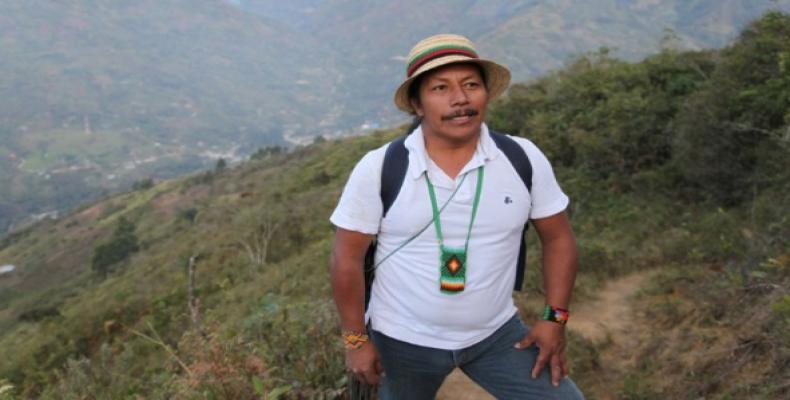Bogotá, November 7 (teleSUR-RHC)-- Colombian Indigenous rights activist Feliciano Valencia will spend his 18-year prison sentence in a detention center on an Indigenous reserve, the Colombian Justice Ministry announced on Thursday. Colombian courts angered Indigenous and human rights activists earlier this year when they sentenced Valencia, a winner of Colombia Peace Prize in 2000 from the Nasa Indigenous community, to almost two decades in prison for allegedly kidnapping a soldier who was on Indigenous territory in 2008. However, according to Indigenous communities, the soldier was arrested because he was dressed as a civilian and infiltrated an Indigenous protest in order to collect intelligence on the movement. Supporters also claim the soldier was arrested by the Nasa community's legally recognized “Indigenous Guard” and sentenced under the Nasa's own justice system. A regional court confirmed on Thursday that given Valencia's Indigenous status, he would be transferred from a prison in San Isidro to a detention center in the reserve Munchique Los Tigres (Munchique The Tigers) in the northern region of the state of Cauca. Activists, including Nobel Peace Prize winner Rigoberta Menchu, have denounced the government's sentencing. Last month, Menchu said it bothered her to see “our brother Feliciano” captured since he has been an important voice for Indigenous people and for peace efforts in the country. Valencia has fought for years for the defense and visibility of Indigenous peoples in the country, particularly the Nasa community, which has been one of the worst affected by the ongoing fighting in Colombia.
Indigenous Rights Activist to Serve 18 Year Sentence on Reserve

Articles en relation
Commentaires
Laissez un commentaire
Tous les champs sont requis
En reproduction maintenant
Desde Mi Habana
Au suivant
- Cartas a la Redacción
- Cancionero Iberoamericano
- Mundo 7
Plus de visites
- Equateur : Luisa Gonzalez réitère sa dénonciation de fraude électorale
- Des villes cubaines et chinoises signent une lettre d'intention pour renforcer les relations bilatérales
- Equateur : Luisa Gonzalez met en garde contre la persécution après l'allégation de fraude
- Le Venezuela rejette un communiqué de l'Équateur "grossier et mal construit"
- Cuba Santé 2025, un espace pour la coopération et les échanges scientifiques

